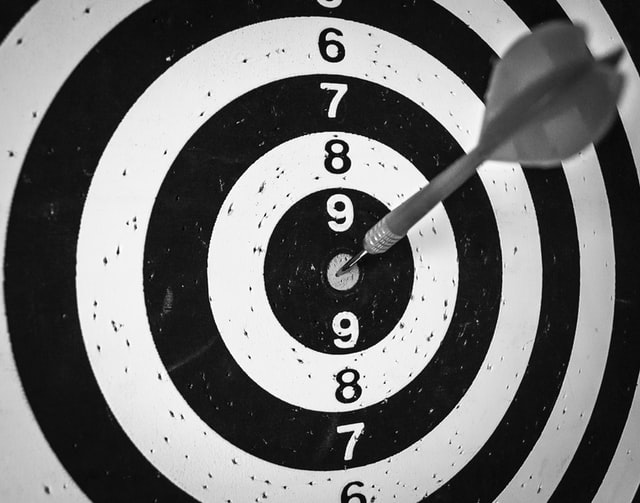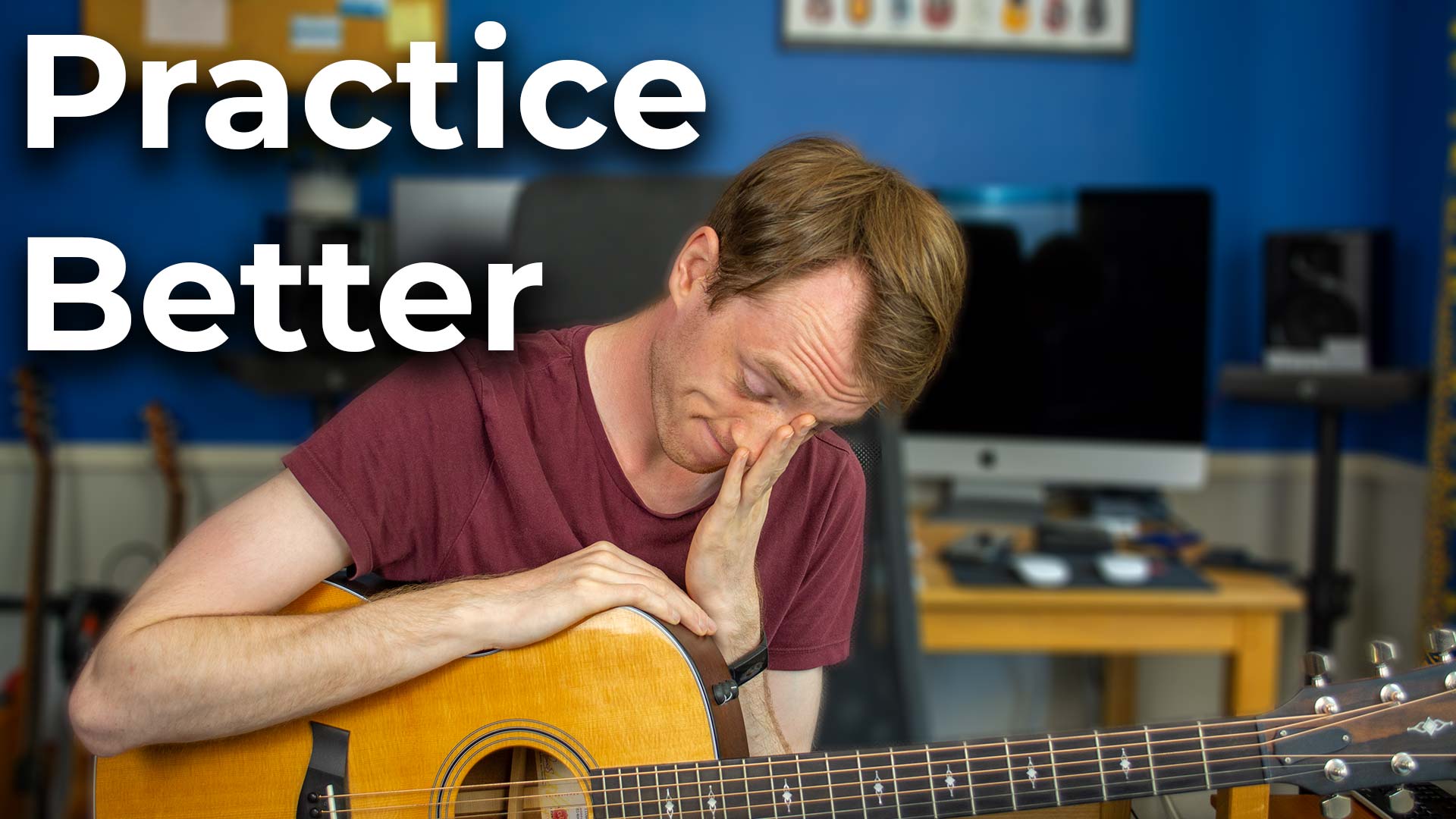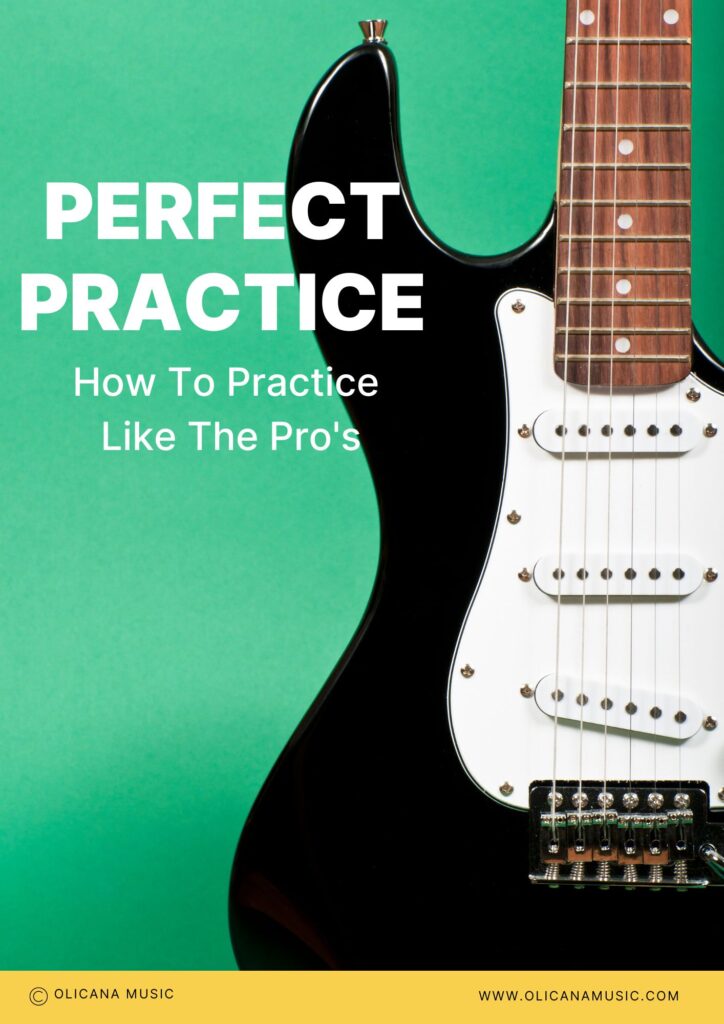Objectives
By the end of the lesson pack you will know:
- How the pros practice better
- How you get better results from your practice
The Practice Habits of Great Musicians
Great musicians have very specific practice habits. There’s a reason that they make progress so quickly, and it’s not all down to natural talent. If you can adopt the same practice habits as great musicians you should see a rapid improvement in your rate of progress. This will reduce your frustration and make the process of learning to play guitar even more fun! Read on to discover what the pro’s are doing differently and to learn how you can improve your own practice habits.
They Are Consistent
One of the most important things you can do if you want to be a great musician is to be consistent. The individuals who see the most success in their careers are not the ones with the most innate talent. But instead those who turned up everyday and put the work in.
When it comes to developing your skills as a musician consistency is king. It’s well established knowledge that if you want to develop a skill you should practice little and often. It’s far more effective to spend half an hour per day on the thing you want to learn, than to spend three and a half hours once a week on it.
Although you might be able learn a lot in a long session, the problem is that you will forget much of what you learned in long intervening period between now and your next practice. This results in you having to relearn much of what you learned previously. Regular repetition is key for skill reinforcement. However you go about it you still need to repeat the thing you are trying to learn to reinforce it. By turning up regularly you reduce the amount you forget between practices and can therefore spend more time practicing what you have learned.
How does this look in reality? You should try to spend time with your instrument every single day. It doesn’t matter if it’s three hours or 30 seconds. The point here is to build the habit of picking up the instrument everyday. On the days you have more free time you will play more, on the days you have less free time you will play less. This will average out over time to be regular, consistent practice.
A great way to build this habit is using a method called “Don’t break the chain.” You can learn more about it here
Exercise – Developing Consistency
They Understand How They Learn Best

Everyone learns differently and you are no different. In order to maximise the effectiveness of their practice, great musician understand how they learn best. Some people like extremely structured practice, others a more relaxed free form practice. It depends on your temperament and it’s something you should know about yourself if you want to get the most out of your practice time.
If you are the kind of person who is highly conscientious, who likes a structured practice schedule that you can follow everyday, you should set up your practice so that it fits these requirements. If however you are not very conscientious, and instead more open. You should not try to conform yourself to a rigid schedule. Instead follow your natural inclination and curiosity with the activity.
You still need to be disciplined enough to turn up everyday and work on whatever your goal is. But you don’t need to spend exactly five minutes doing warm ups, then 10 minutes on three very specific goals. If you are only interested in one of your goals today focus on that. Curiosity will take you towards other goals in the future.
It’s worth remembering that this isn’t binary, it’s a spectrum. Some people need lots of structure, some very little, and others exist somewhere in the space in between. If you don’t know how you learn best already you should spend time experimenting so that you figure it out. Create a rigid practice structure for yourself. If you don’t follow it, why not?
Adapt the schedule as necessary until you do follow it. Your schedule is not a tyrant, you get to decide how it’s put together so you should build it to fit your ideal. At bare minimum it’s simply picking up the guitar every day, at most you might have it structured to the minute. Experiment and figure out what works best for you.
Exercise – Figure Out How You Learn
They Have A Higher Order Goal
Great musicians don’t play their instruments without reason. They find meaning in playing music and therefore are compelled to pursue it. It’s worth understand why you find playing your instrument meaningful, and then create higher order goals that generate more of those meaningful experiences.
This is what great musicians do. They pick and pursue goals that are meaningful to them, the goals then become a source of pleasure (because they are meaningful), and as such they continue to pursue them. This results in a positive feedback loop of goal pursuit and reward, which produces rapid progress.
For me, the reason I’m driven to play music is primarily social, I love jamming with other musicians, playing in bands, and sharing a musical experience. This is part of the reason I ended up teaching, it brings me great joy to share my passion with other people.
Knowing that I’m going to play with other people encourages me to practice more, so that I can share the things i’m learning with them, and so that i’m not underprepared on the day. I make sure that my higher order goals have a social aspect to them, because the social aspect is the reason I play. This inspires me to to pick up my instrument, and therefore I make progress.
You need to understand why playing a musical instrument is meaningful to you. It might be for social reasons, as a creative outlet, or maybe just the sheer act of playing brings you joy. You can then set higher order goals that incorporate this sources of meaning. For example playing in a band, writing an album, or having a repertoire, respectively. From these higher order goals you can figure out your specific goals which we’ll talk about next.
Exercise – Define A Higher Order Goal
They Have A Specific Goal

Once you understand your higher order goal you can set specific goals for your practice sessions. These specific goals should facilitate the achievement of your higher order goal. Great musicians spend time on specifics. They understand that by being specific they can take the most direct route to their main goal, as such making their progress quicker.
In order to figure out what specific goals you need to set yourself, you have to break down your higher order goal into smaller pieces. Then you should pick the smaller goal that will take you towards you larger goal in the most direct manner. Once this is goal is complete you will be a little wiser. You can then break down your higher order goal again and pick the sub goal that is the next most direct. Repeating this process will allow you to zigzag towards your primary goal in the most direct manner possible.
When you start learning something you don’t know what you don’t know. As such you will never take the perfect path towards attaining your primary goal. However by breaking your higher order goal into sub goals, then picking the sub goal that will take you in the most direct manner that you can see towards your main goal. You’ll move forward in the most efficient way that you possible can, given your limited knowledge.
Exercise – Define Your Specific Goals
They Practice What They Can’t Do
This is the biggest secret to making progress with a skill. You should practice the things you can’t do. The most direct route towards your higher order goal is through the things you don’t understand, and cannot yet do. Great musicians understand this principle and use it to their advantage. They build a habit of making sure that their practice sessions are focused on things they can’t do yet, and make rapid progress as a result.
Working on things you can’t do takes discipline and tenacity. If you are going to work on things you find challenging you will inevitably make mistakes. This can be mentally and emotionally taxing if you aren’t used to it. As such it is very common to see students avoid making mistakes. Either because it makes them feel better whilst they practice, or because they hold the common misbelief that mistakes are bad and that committing them will somehow introduce bad habits into their playing.
Successful musicians are not afraid of making mistakes. They understand that if you want to make progress mistakes are inevitable, in fact they are necessary. You cannot learn without making mistakes, as such you should embrace them as a friend, not something to be avoided. Whenever you learn anything new mistakes are part of the process. They are never a bad thing so long as you are not ignoring them. A mistake ignored can become a bad habit. Mistakes that you try to correct are a stepping stone towards your final goal.
Your practice sessions should focus on what you can’t do. Reinforcing skills you have already mastered is not an effective use of your time if you want to improve. Improvement by definition is the product of going from not being able to do something, to being able to do it. Therefore you should focus on skills you haven’t yet attained, that are the most direct route to your higher order goal.
Exercise – Identify What You Can’t Do
Putting It In To Practice
Conduct an evaluation of your practice relative to the ideas discussed in the lesson. Take each of the sections from the video and ask yourself, how does what you’re doing compare to what we discussed? Are you consistent? Do you have goals established. Figure out where the deficits in your practice routine are and try to come up with way to fix them.
Once you’ve done that integrate your learnings from the previous exercises in the lesson pack. Use what you learn to build a new practice routine and improved practice routine.



Ask your questions in the community